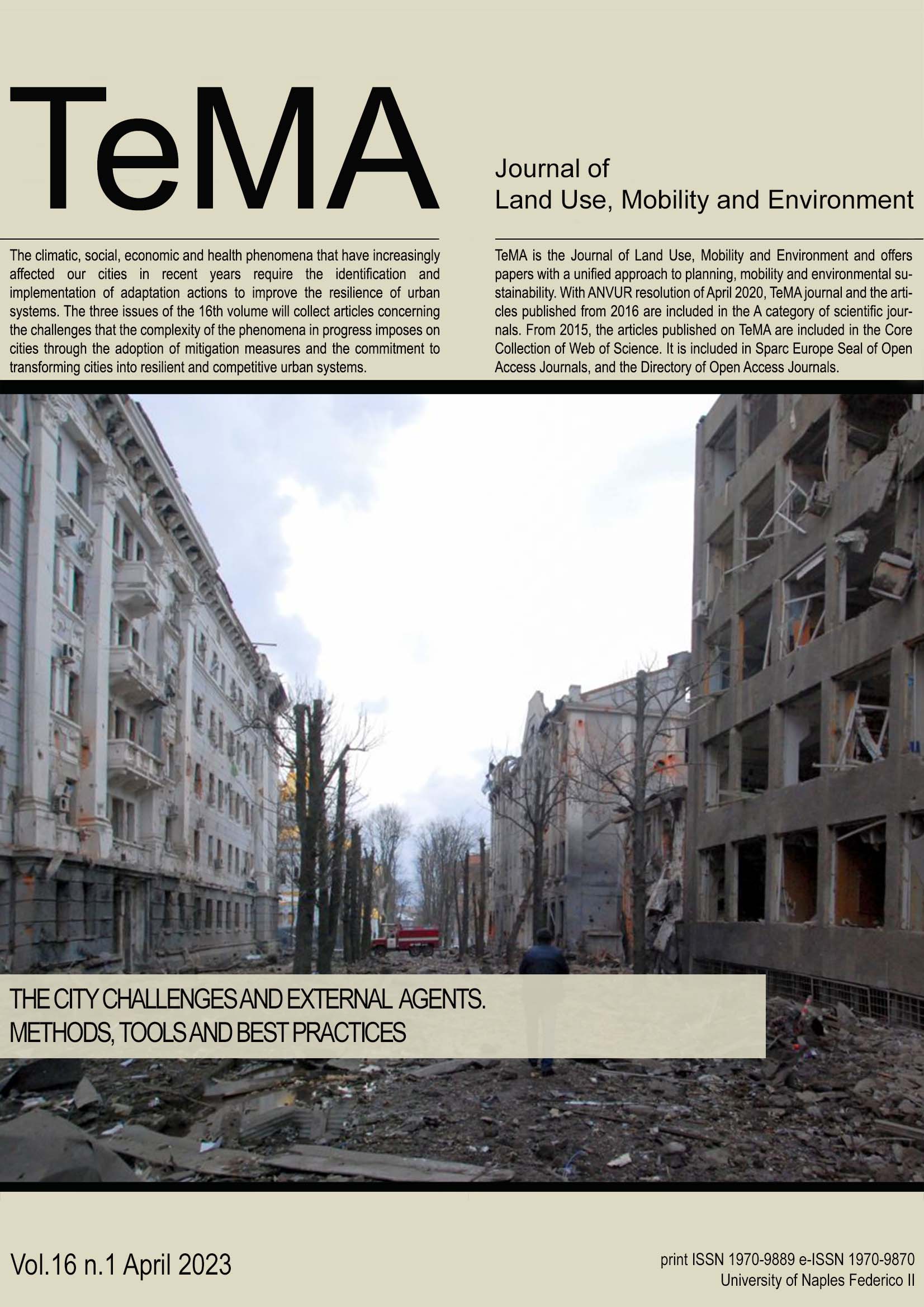The interventions of the Italian Recovery and Resilience Plan: digitalization in cities
Abstract
Starting from the relationship between urban planning and mobility management, TeMA has gradually expanded the view of the covered topics, always following a rigorous scientific in-depth analysis. This section of the Journal, Review Notes, is the expression of a continuous updating of emerging topics concerning relationships among urban planning, mobility and environment, through a collection of short scientific papers. The Review Notes are made of five parts. Each section examines a specific aspect of the broader information storage within the main interests of TeMA Journal. This section of the Review Notes deals with the new frontiers of urban development through the lenses of the European program NextGenerationEU. In particular, this contribution deepens the topic of digitalization in urban areas within the framework of the Italian National Recovery and Resilience Plan. It provides an overview of the proposed reforms, strategies and interventions to boost the digital economy and digitalize public services within the urban context.
Downloads
References
Aldegheishem, A. (2019). Success factors of smart cities: a systematic review of literature from 2000-2018. TeMA-Journal of Land Use, Mobility and Environment, 12(1), 53-64. https://doi.org/10.6092/1970-9870/5893
Allam, Z., & Jones, D. S. (2021). Future (post-COVID) digital, smart and sustainable cities in the wake of 6G: Digital twins, immersive realities and new urban economies. Land use policy, 101, 105201. https://doi.org/10.1016/j.landusepol.2020.105201
Bailey, D., Crescenzi, R., Roller, E., Anguelovski, I., Datta, A., & Harrison, J. (2021). Regions in COVID-19 recovery. Regional Studies, 55(12), 1955-1965. https://doi.org/10.1080/00343404.2021.2003768
Batty, M., Axhausen, K. W., Giannotti, F., Pozdnoukhov, A., Bazzani, A., Wachowicz, M., ... & Portugali, Y. (2012). Smart cities of the future. The European Physical Journal Special Topics, 214, 481-518.
Caglioni, M. (2023). Il divenire della disciplina urbanistica: il contributo di Matteo Caglioni. TeMA-Journal of Land Use, Mobility and Environment, 181-187. https://doi.org/10.6093/1970-9870/9743
Dana, L. P., Salamzadeh, A., Hadizadeh, M., Heydari, G., & Shamsoddin, S. (2022). Urban entrepreneurship and sustainable businesses in smart cities: Exploring the role of digital technologies. Sustainable Technology and Entrepreneurship, 1(2), 100016. https://doi.org/10.1016/j.stae.2022.100016
Dipartimento per la trasformazione digitale (2023). Le misure del PNRR. Su PA digitale 2026 il dettaglio delle opportunità del PNRR dedicate alla digitalizzazione della Pubblica Amministrazione: fondi allocati, beneficiari e modalità di accesso alle misure. Retrieved from: https://innovazione.gov.it/progetti/
European Commission (2021). NextGenerationEU. Retrieved from: https://ec.europa.eu/info/strategy/recovery-plan-europe Fernandes, S. (2021). Which way to cope with COVID-19 challenges? Contributions of the IoT for smart city projects. Big Data and Cognitive Computing, 5(2), 26. https://doi.org/10.3390/bdcc5020026
Fistola, R., & Rastelli, A. (2021). Envisaging urban changes for the smart city: The live city information modeling (LCIM). In Innovation in Urban and Regional Planning: Proceedings of the 11th INPUT Conference-Volume 1 (pp. 161-169). Cham: Springer International Publishing.
Gargiulo C., Guida N., & Sgambati S. (2022). NextGenerationEU in major Italian cities. TeMA - Journal of Land Use, Mobility and Environment, 15 (2), 287-305. https://doi.org/10.6093/1970-9870/9260
Governo Italiano (2021). Italia domani. Piano Nazionale di Ripresa e Resilienza. Retrieved from:
https://italiadomani.gov.it/en/home.html
Granier, B., & Kudo, H. (2016). How are citizens involved in smart cities? Analysing citizen participation in Japanese``Smart Communities''. Information Polity, 21(1), 61-76.
Guida, C. (2021). Ecological transition: innovation in cities. TeMA-Journal of Land Use, Mobility and Environment, 14(3), 493-500. https://doi.org/10.6093/1970-9870/8304
Halegoua, G. (2020). Smart cities. MIT press.
Kim, H. M., Sabri, S., & Kent, A. (2021). Smart cities as a platform for technological and social innovation in productivity, sustainability, and livability: A conceptual framework. In Smart Cities for Technological and Social Innovation (pp. 9-28). Academic Press.
Lai, S., Leone, F., & Zoppi, C. (2020). Covid-19 and spatial planning: a few issues concerning public policy. TeMA, (Special Issue: Covid-19 vs City-20), 231-246. https://dx.doi.org/10.6092/1970-9870/6846
Malecki, E. J. (2002). Hard and soft networks for urban competitiveness. Urban studies, 39(5-6), 929-945.
https://dx.doi.org/10.1080/00420980220128381
Openpolis (2021). I nostri opendata per il monitoraggio del PNRR. Retrieved from: https://www.openpolis.it/i-nostri-opendata-per-il-monitoraggio-del-pnrr/
Raspe, O., & Van Oort, F. (2006). The knowledge economy and urban economic growth. European Planning Studies, 14(9), 1209-1234. https://doi.org/10.1080/09654310600933322
Yigitcanlar, T., Velibeyoglu, K., & Martinez‐Fernandez, C. (2008). Rising knowledge cities: the role of urban knowledge precincts. Journal of knowledge management, 12(5), 8-20. https://doi.org/10.1108/13673270810902902
Copyright (c) 2023 TeMA - Journal of Land Use, Mobility and Environment

This work is licensed under a Creative Commons Attribution 4.0 International License.
Authors who publish in this journal agree to the following:
1. Authors retain the rights to their work and give in to the journal the right of first publication of the work simultaneously licensed under a Creative Commons License - Attribution that allows others to share the work indicating the authorship and the initial publication in this journal.
2. Authors can adhere to other agreements of non-exclusive license for the distribution of the published version of the work (ex. To deposit it in an institutional repository or to publish it in a monography), provided to indicate that the document was first published in this journal.
3. Authors can distribute their work online (ex. In institutional repositories or in their website) prior to and during the submission process, as it can lead to productive exchanges and it can increase the quotations of the published work (See The Effect of Open Access)

